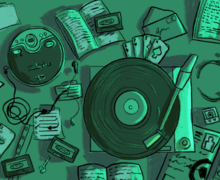Opinion: Return to physical media to counter online uncertainty
Samantha Siegel | Contributing Illustrator
Social media is falling victim to political censorship and unjust alteration. Collecting magazines, novels and similar forms of media can help rebel against the current administration's agenda, our columnist says.
Get the latest Syracuse news delivered right to your inbox.
Subscribe to our newsletter here.
Until this point in my life, the internet’s been a safe haven for me.
When I was in high school, I loved curating Instagram fan pages for my favorite bands and YouTubers. During COVID-19’s quarantine period, I found comfort in watching Twitch streamers and consuming content from services like Netflix and Max.
What seems like the hobbies of any socially awkward teenager with an internet connection were truly an escape. At the time, I was struggling to come to terms with my queer identities and mental health. Being able to connect with like-minded people from around the world gave me a sense of community while I struggled to find one in my hometown.
So, it’s painful for me to admit the internet’s charm is gone.
Access to apps like TikTok has become a maneuverable political tool for people like President Donald Trump to maintain a firm grip on their power. X has been transformed from its original role as a quick-to-use microblogging service into Elon Musk’s newest capitalist pay-to play. The ethical conundrums of Meta CEO Mark Zuckerberg taking the internet on a tirade of misinformation, one misleading headline at a time, are hard to ignore.
Today, I approach social networks with a sense of caution, realizing they are no longer the community-building spaces I once adored, but rather invitations for division and harm. I’ve taken a step back — or at least am trying to. This detox involves the tall task of forcing my eyes off my screen and onto the real world.

Joe Zhao | Design Editor
My friends and I routinely find ourselves rummaging through stores, including the Barnes & Noble on Erie Boulevard, Syracuse Antique Exchange and Books and Melodies. These outings have reintroduced me to the wonders of physical media: books, records and CDs, art prints, old photographs and more.
Originally I was drawn to these items as a means of unplugging from stressors. I felt significantly less pressured while reading a paperback book than an online news article. To me, the world and its problems begin to feel more manageable when I’m surrounded by callbacks to tangible culture of the past.
Over time, I’ve realized owning physical pieces of media carries importance far beyond simply removing yourself from the screen. In an online world where literally everything is at our fingertips, I often fail to properly appreciate the true value of art and unchangeable information.
I can dismiss my online findings just as quickly as I’ve found them; anything and everything is a click away on the internet. It doesn’t work that way with a physical record or book, which relies on your own determination of which information is important to keep when purchasing.
This sense of mundane convenience on the web is substituted with the ability to curate a personal collection of material expressions of your personality, along with the opportunity to invest your resources into something you’ll enjoy for the long haul.
You’re unlikely to spend $20 on a book you’re only partially interested in, but you might make the same financial investment on a broader subject you’re certainly passionate about. Physical media encourages us to explore our genuine interests and curate our sense of identity through the items we choose to collect and use.
Further, there’s the quality of longevity that comes with physical media that online spaces can’t offer. Websites can be updated and certain content can be restricted or removed entirely, but if you’re in possession of a physical magazine, the information printed within it can’t be altered.
This moment in American history is currently marked by censorship from the Trump-Vance administration in areas such as LGBTQ+ history, diversity, equity and inclusion and scientific research. Just within the past week, all references to the transgender community were removed from the Stonewall National Monument’s webpage.
Physical media acts as a way to preserve history without having to worry about the source material being edited to fit agendas. As long as you can maintain your own copy of a book, piece of art or record, its information survives for the next person you lend it to.
This is especially crucial now, during a time when government officials are working to erase decades of history and mislead the American public into following their conservative programming.
To combat this, take the time to visit your local thrift and used book stores. Explore markets featuring items from Syracuse vendors, like Wildflowers Armory downtown.
Learn to appreciate the effort and meaning behind the production of individual pieces of art and media. Think about what that can mean in terms of disconnecting from the greater digital market, which aims to serve you convenience over personal meaning.
The internet is woven so deeply into our everyday routines, so I don’t think it’ll be easy to completely disconnect from the digital space anytime soon. Taking the time to engage with physical media is a way to reclaim and prioritize not only our sense of self, but also the roots our modern society sprouted from.
Gray Reed is a senior majoring in magazine, news and digital journalism. Their column appears bi-weekly. They can be reached at greed04@syr.edu.
Published on February 19, 2025 at 9:41 pm






